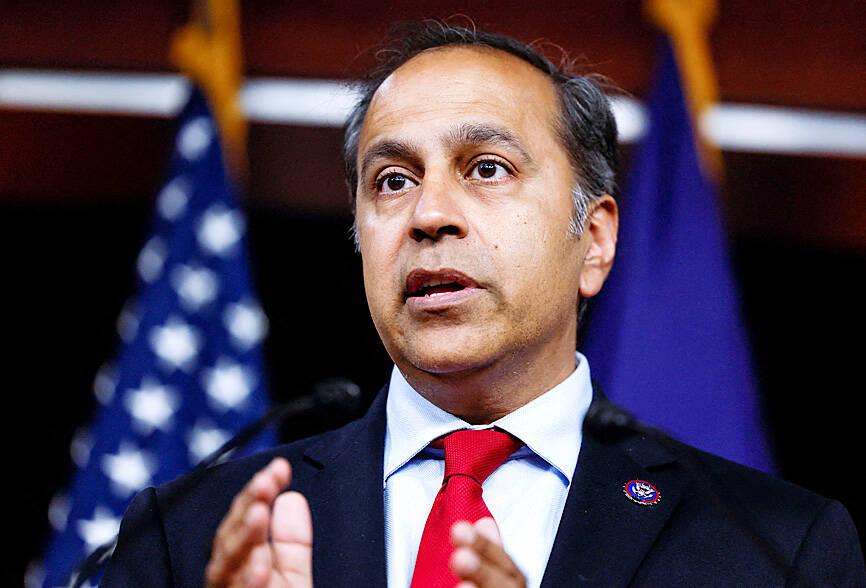A US House of Representatives committee yesterday passed a package bill that includes authorizing funding to help Taiwan improve its diplomacy and making the “six assurances” a formal law.
The Taiwan Allies Fund Act and Six Assurances to Taiwan Act were incorporated into the State Department Reauthorization Bills, which were passed by the House Committee on Foreign Affairs last night.
The acts were proposed by US Representative Raja Krishnamoorthi, who serves on the House Select Committee on the Strategic Competition Between the US and the Chinese Communist Party.

Photo: Reuters
The Taiwan Allies Fund Act would authorize the executive branch to allocate US$120 million over a three-year period to assist Taiwan’s diplomatic allies and unofficial partners that are facing pressure from China.
Countries eligible to apply for the fund would have to be maintaining formal diplomatic relations or significantly reinforcing informal ties with Taiwan, facing coercion from China due to their relationship with Taiwan and lacking the economic or political capacity to effectively withstand Chinese pressure without US support.
The Six Assurances to Taiwan Act would require codifying into law the “six assurances” made by the administration of former US president Ronald Reagan and ensure that no administration can alter these principles without congressional approval.
The “six assurances” stipulate that the US would not set a date to end arms sales to Taiwan, change the Taiwan Relations Act, consult with China on arms sales to Taiwan or act as a mediator between Taiwan and China.
Regarding sovereignty, the assurances say that the US would not formally recognize Chinese sovereignty over Taiwan or pressure Taiwan to negotiate with China.
By advancing these bipartisan provisions, the US Congress is standing firmly with Taiwan to resist China’s coercion and intimidation, Krishnamoorthi said.
The two acts would bolster the partnership between Taiwan and the US, counter China’s economic coercion and reinforce peace and stability in the Taiwan Strait, he said.
The package bill must be approved by the US House of Representatives, US Senate and US president to become law.

SHIPS, TRAINS AND AUTOMOBILES: The ministry has announced changes to varied transportation industries taking effect soon, with a number of effects for passengers Beginning next month, the post office is canceling signature upon delivery and written inquiry services for international registered small packets in accordance with the new policy of the Universal Postal Union, the Ministry of Transportation and Communications said yesterday. The new policy does not apply to packets that are to be delivered to China, the ministry said. Senders of international registered small packets would receive a NT$10 rebate on postage if the packets are sent from Jan. 1 to March 31, it added. The ministry said that three other policies are also scheduled to take effect next month. International cruise ship operators

NUMBERS IMBALANCE: More than 4 million Taiwanese have visited China this year, while only about half a million Chinese have visited here Beijing has yet to respond to Taiwan’s requests for negotiation over matters related to the recovery of cross-strait tourism, the Tourism Administration said yesterday. Taiwan’s tourism authority issued the statement after Chinese-language daily the China Times reported yesterday that the government’s policy of banning group tours to China does not stop Taiwanese from visiting the country. As of October, more than 4.2 million had traveled to China this year, exceeding last year. Beijing estimated the number of Taiwanese tourists in China could reach 4.5 million this year. By contrast, only 500,000 Chinese tourists are expected in Taiwan, the report said. The report

The Forestry and Nature Conservation Agency yesterday launched a gift box to market honey “certified by a Formosan black bear” in appreciation of a beekeeper’s amicable interaction with a honey-thieving bear. Beekeeper Chih Ming-chen (池明鎮) in January inspected his bee farm in Hualien County’s Jhuosi Township (卓溪) and found that more than 20 beehives had been destroyed and many hives were eaten, with bear droppings and paw prints near the destroyed hives, the agency said. Chih returned to the farm to move the remaining beehives away that evening when he encountered a Formosan black bear only 20m away, the agency said. The bear

HORROR STORIES: One victim recounted not realizing they had been stabbed and seeing people bleeding, while another recalled breaking down in tears after fleeing A man on Friday died after he tried to fight the knife-wielding suspect who went on a stabbing spree near two of Taipei’s busiest metro stations, Taipei Mayor Chiang Wan-an (蔣萬安) said. The 57-year-old man, identified by his family name, Yu (余), encountered the suspect at Exit M7 of Taipei Main Station and immediately tried to stop him, but was fatally wounded and later died, Chiang said, calling the incident “heartbreaking.” Yu’s family would receive at least NT$5 million (US$158,584) in compensation through the Taipei Rapid Transit Corp’s (TRTC) insurance coverage, he said after convening an emergency security response meeting yesterday morning. National